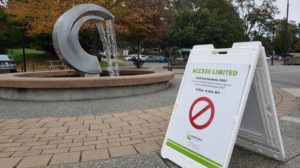Camosun College recently received $195,000 of emergency student funding from the provincial government. The funds, which the college received last month through the Ministry of Advanced Education, Skills and Training, are the latest in a total of $397,000 the government has given the college for pandemic relief for students as part of its larger $9-million investment to help post-secondary students through the COVID-19 crisis.
So far in 2021, students have received $3 million of emergency aid, while Indigenous students received an additional $1 million. NDP Oak Bay-Gordon Head MLA Murray Rankin, who is also the BC minister of Indigenous relations and reconciliation, calls the money received in 2021 a top-up to the $1.5 million in emergency funding that Indigenous students received in 2020. (The government gave out $3.5 million in other emergency student aid in 2020.)
Of the $397,000 Camosun has received, $294,000 went towards student emergency assistance funding ($140,000 of that was received in March 2020, while an additional $154,000 was received in March 2021); $103,000 went towards the Indigenous Emergency Assistance Fund ($62,000 of that was received in March 2020, while $41,000 was received in March 2021).

The aid can help cover food, travel expenses, living expenses, computers, and other supports for students.
Camosun vice president of student experience Heather Cummings says the funding from last year has been spent and that most of the new money will be used to top up the college’s Erasing Barriers to Education fund.
“Lots of students lost part-time jobs, didn’t have means by which to pay for things in an emergency, but also to help pay for their educational costs—things that they normally would have had some additional money to pay for,” she says.
Rankin says that making sure the workforce is properly educated is essential, and says that the Indigenous funding is an example of the calls to action in the Truth and Reconciliation Act.
“The whole point of this fund is to support our commitment to implement the United Nations Declaration on the Rights of Indigenous Peoples, and the calls to action that the [Truth And Reconciliation Act] required us to do,” he says.
Rankin says the additional funding has been sent to Camosun and students in need can access it through the financial aid office.
“Having access to emergency relief funds was just indispensable to many Indigenous students,” says Rankin. “They just couldn’t complete their studies without it. Along with emergency living expenses, the fund supports Indigenous students to travel home, because they have their community protocols in times of emergency.”
Rankin says COVID-19 has “turned our lives upside down” and that he doesn’t want to duck the question of whether or not this funding is actually enough for what students need.
“There’s never enough money to do everything that’s needed in a pandemic,” he says. “This government has been, I’m proud to say, more generous than any other across the country on number of supports given to small businesses, to tourism, to hospitality, to all of that, and students should be treated with the same level of concern… is that enough? I don’t know.”
Cummings, who says that this funding has been given out to 1,200 Camosun students so far, points out that other emergency funds for students have come from the Camosun College Student Society and the Camosun Foundation. Part of the reason the college is keeping the use of the funding so broad, she says, is because of the variety of hard situations many students are in.
“We don’t want to define ‘hardship’ too narrowly,” she says.
Rankin says that while a really tough few weeks are in store for everyone in British Columbia, help is on the way.
“We want students to succeed,” he says. “We have one of the best educated workforces in the world, and we want to build that. The pandemic shouldn’t stop us from working hard to make sure that every student facing financial hardships can access assistance when they need it.”
To date, Camosun, the University of Victoria, and Royal Roads University have together received a total of $1,162,500. These funds are all on top of an annual $100,000 the government gives to post-secondary institutions across BC for student emergency assistance funding.
